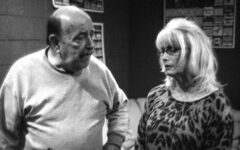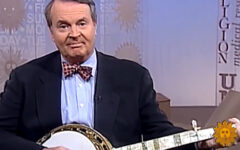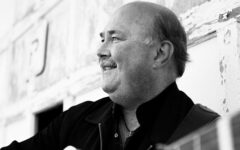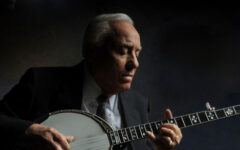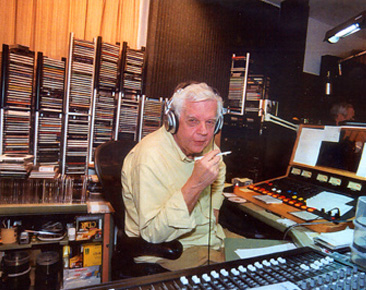
 Renowned bluegrass DJ Ray Davis passed away during the evening of December 3, 2014. He had been battling against leukemia for most of the past year.
Renowned bluegrass DJ Ray Davis passed away during the evening of December 3, 2014. He had been battling against leukemia for most of the past year.
As we have told Ray Davis life story quite well in the past, we asked notable Bluegrass Unlimited columnist Walt Saunders to share his recollections of Ray Davis’s career….
“Ray was a veteran broadcaster who started as a teenager, and worked many stations. I first heard Ray on station WBMD in Baltimore, Maryland, in the early 1960s when he was broadcasting from Johnny’s Used Cars (‘the walking man’s friend’). One of his sayings was, ‘Working close to save you money.’ He started selling albums on his on Wango label (pronounced ‘Wine-go’), and I ordered some from him – the Stanley Brothers, who recorded for him under the name ‘John’s Gospel Quartet’ and ‘John’s Country Quartet.’ He also MCed countless live shows (and later bluegrass festivals) in the region.
For many years he was affiliated with WAMU (public radio from American University) in Washington, D.C., on Bluegrass Country. Twice a year, he would host a fundraiser on his show, and raised a whole lot of funds for the station, far out of proportion to the amount of radio time his show had—compared to other programming on the station. He would offer as premiums recordings he made in his home studio (known as ‘basement tapes’). He favored the sad songs, which he called ‘plumb pitiful tunes.’ I tried never to miss his show during fundraisers. He was the ultimate radio salesman. It was fascinating to hear him work the radio audience, I suppose much like he did when he was a ‘pitchman’ on XERF, Del Rio, Texas, one of the legendary Mexican border stations.
Ray Davis knew bluegrass inside and out — he was a close friend of many of the first generation of bluegrass artists (the Stanley Brothers, Reno & Smiley, Mac Wiseman and Charlie Moore, to name a few). He could tell you stories of the artists he knew that would keep you in stitches for hours. He was one-of-a-kind in the world of bluegrass, and will be sorely missed by us all.”
Carl Goldstein, Chair of the Brandywine Friends of Old Time Music (BFOTM) and a Director of the Delaware Valley Bluegrass Festival remembers that Davis was a master of the stage as well as the radio …….
“Ray emceed the Delaware Valley Bluegrass Festival for 39 years. He was a brilliant MC with a spell binding voice, a sharp sense of humor and a deep understanding of the history and nature of the music. He himself of course was a significant part of that history as a radio personality and producer. He was unique and a good friend. He will be missed.”
Gary B Reid, who lived in Silver Spring, Maryland, used to listen to Ray Davis in his younger years …
“I became aware of Ray Davis back in the middle 1970s as I was researching the recordings of the Stanley Brothers. In 1974/1975, I was working as a bank teller in a little town called Burtonsville, Maryland, which was situated between Baltimore and Washington. The radio station that Ray broadcast on at the time, WBMD from Baltimore, didn’t have a very strong signal, but I could just barely tune it in on a transistor radio that I took with me to the bank. His program aired, I believe, from 4:00 to 4:30. I remember the excitement of hearing him play the Stanley Brothers doing Going to Georgia, a track he had the boys do for him on one of his radio broadcasts.
In addition to his radio work, Ray was an avid concert promoter. I remember going to at least one of his events, at a place called the Seagull Inn. He had Ralph Stanley booked there, as well as the Johnson Mountain Boys. Good show!
I followed his career when he moved to WAMU in Washington. And, of course, when that station developed a web presence with BluegrassCountry.org, people all over the world were able to know and follow his career. I was a faithful listener to that webcast for many years.
To me, though, his greatest legacy will be his pioneering efforts in bringing bluegrass to the Mid-Atlantic states in the 1950s and 1960s. I think Ray deserves much of the credit for the popularity of the music in the Baltimore-Washington and surrounding areas.”
Archie Warnock, stage manager for the Delaware Valley Bluegrass Festival, remembers seeing how Marty Stuart introduced each of his band members to Ray Davis and made sure that they were very much aware of Davis …
“Most Ray Davis stories aren’t fit for public consumption – he was quite the character! Carl Goldstein would be a good one to ask because he’d known Ray for so many years.
I don’t think he really cared for me all that much, viewing me as one of that ‘IBMA’ crowd that he thought was ruining the music. But I stuck around him because he was so damn interesting and he warmed up enough to tell me a few stories. I’ve been doing some MC work myself the past few years and Ray was my primary influence on how to do the job right.
The best anecdote is the one I posted on BGRASS-L about Marty Stuart. It was such an cool moment, to be close enough to backstage to see what was going on but to realize that Marty wasn’t doing it as a show for anyone – he genuinely knew Ray’s importance and wanted to make sure the band knew who he was, too. One of the great moments of the festival.
Remember – Ray started in radio back in the late 1940s, so he’d been in the business over 20 years when he started as the MC for the Delaware Valley Bluegrass Festival our second year (1973). And he continued through our 40th festival before he retired. I believe ours was the last festival he MCed for, other than his own. We actually tried to get him to come out one last time for what would have been his 40th year, but he declined.
Ray did tell me that in all the years he worked with the Stanley Brothers, he only ever had one contract with them. It was the first time he brought them up from Florida to work for him in Baltimore. He said they hand-wrote the contract on the back of one of Ray’s promo photos and he kept it, with Carter’s signature, for years. As I recall, he paid them something like USD $500 – for the entire band, for a week of as many gigs as he could pack into that week – clubs, car lots, shopping centers, you name it. And never needed anything more than a handshake with them after that.
He was a genuine personality – cranky, opinionated and one of a kind. He also was the most professional MC I’ve ever been around. With Ray Davis, the show always ran on time. You could set your watch by it. He knew every band, and even when he didn’t, the audience thought he did. Every band he ever introduced got the same enthusiastic intro. He knew when to talk and when to be quiet. The vendors all loved him because he was a consummate salesman and could get people over to their booths pretty much any time to buy pretty much anything.And Ray loved pies. If you needed something and brought him a pie when you asked, more than likely he’d do it. He’d grumble and cuss, but he’d still do it.
He also loved Eddie Stubbs and loved it when Eddie would imitate him – which Eddie could do perfectly.
I hope he knew how much he was admired, although he’d never have admitted caring about it.”
Thanks to his Wango recordings, Ray Davis had fans all over the world as British bluegrass musician and journalist John Atkins exemplified ………
“I met Davis years ago in his studio on Johnny Fairbanks Used Car Lot in Baltimore. He had piles of tapes of the Stanleys and others that I think over time, Dave Freeman purchased. Davis knew his music and how to get the best out of people (musically). He probably only paid the Stanleys in whiskey.
I had picked out a few EPs and singles on Wango for which he was about to charge me a very high price. Before I paid a man came in with an attractive girl he was ‘toting’ and a single for Davis to consider. It was dreadful and it seemed the lyrics consisted of little more than repeating the title as many times as possible. Davis introduced me to them as being from England and also Dave as a record owner. The nice man then gave me a copy of the single, his business card, and insisted on paying for my records. I of course protested, but not enough to put him off the idea! I think I may have lost the record quite soon after.”
Dick Spottswood, who co-wrote WAMU Bluegrass Country’s remembrance, was eager to add his voice here …….
“Ray represented a big slice of history, and for six decades was a prominent voice of country and bluegrass music across much of the mid-Atlantic region. He enjoyed warm friendships with many of the music’s principal figures, respected their artistry, helped them find work and, above all, made sure they were heard on radio day after day and year after year. On the air, Ray’s warm, welcoming personality built him a faithful audience that followed him from his earliest days on WDOV in Dover, Delaware and border radio in Del Rio, Texas, to WBMD in Baltimore and, in 1985, to WAMU, where he added thousands of public radio listeners to his fan base.
Ray and Nona became my friends over the years and we’ve spoken often since I moved to Florida. I join all of you in mourning the passing of a uniquely gifted broadcaster who brought an abundance of style, status, and pure class to us when he left commercial radio and came to us.”
Gary Henderson, who helped to write WAMU Bluegrass Country’s remembrance, is another long-time friend and colleague. He provides a humorous look at Davis’s bluegrass music preferences ………..
“We were both MC-ing a bluegrass festival in Maryland, and he gave me ‘the devil’ with lots of expletives, partly in jest, for me playing the Seldom Scene on my Saturday radio program. I defended my action by saying these were personal friends of mine and internationally known bluegrass artists. They may not represent your hard-core traditional mould, but as a responsible bluegrass broadcaster, I would be a fool not to play their music. When I stepped down from the show in September 1985, Jerry Gray asked Ray if he would be interested in taking my shift. Ray agreed, and the on his first show, would you believe he played, the Seldom Scene, My Little Georgia Rose. Well, I could not resist rubbing a little mud and called the ‘hot-line’ and gave him a back a few of his expletives asking why he’s playing the Seldom Scene?
He laughed, and said this must be Henderson — I laughed, said a few more of his expletives and he hung up on me. We joked about it years later, it was all in fun, but he was serious about his Traditional Bluegrass.”
On the west coast Peter Thompson was a recent addition to the Ray Davis fan club …..
“I never met Ray Davis — or listened to his radio shows until the last decade or so on WAMU. But he had a significant influence on me, as well as on our music as a whole. Ray’s recordings from Johnny’s Used Cars in Baltimore and from his basement have been a source of pleasure and inspiration (and material) since I began doing bluegrass radio in the mid-1970s. His Wango LP of a Stanley Brothers 1963 show at Ray’s studio over the sales office of Johnny’s Used Cars contains not only terrific music but also Ray’s intros, commercials and commentary. He somehow managed to be simultaneously folksy, dignified and enthusiastic, welcoming to both the musicians and his audience. The County releases of his Stanley Brothers recordings on Wango also came out in the mid-1970s, and cemented my appreciation for the music that drew me to bluegrass. And the ‘Radio Series’ CDs of his basement recordings with the Stanleys, Paisley/Lundy clan, James King, David Davis and many others are a constant reminder that our music is often most powerful when it’s performed spontaneously in a relaxed setting.
I miss no longer being able to get a bit of Ray’s knowledge, experience, and excitement when I listen to WAMU, and I regret the end of his thrilling home recordings. But I’m very grateful for what he gave us: ‘ … a great show that I know you’ll enjoy. Turn up your radio; your neighbors might enjoy it too.’ “
Born in Wango, Maryland, on May 2, 1933, Ray Davis is as much a part of bluegrass music history as are the bluegrass pickers and singers that he spoke of so glowingly.

